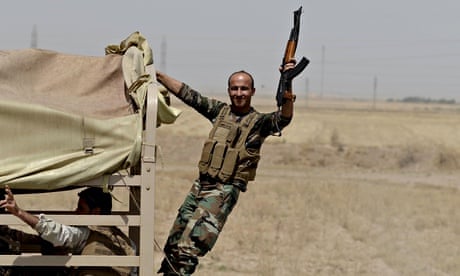Kirkuk was under new management on Friday. No one was quite sure how long it would last. For Kurds, it represented a historic moment: finally in charge of the city and its surrounding areas after the Iraqi army abandoned its positions in the face of the Isis Sunni onslaught. And even for some Arabs there was a sense that security under the Kurds was better than mayhem under someone else.
Mohammad, a Sunni Arab, was six years old when his father, a civil servant, was persuaded by the government to move to Kirkuk from Baghdad. "I am happy for the [Kurdish military] peshmerga forces to stay in Kirkuk if they can bring security to the residents," he said, blaming the government of the prime minister, Nouri al-Maliki, for the lack of security in the country. "Maliki has filled the prisons with Sunnis and intensified the sectarian tendencies in the society."
In the Iskan and Rahim Awa districts of the city, Kurdish security forces are visible everywhere and have erected new road blocks every few hundred metres.
Murad, a Kurd born in 1985 in the town of Tuz Khurmatu, which is a few kilometres away from where the peshmerga forces are still fighting the Isis militants outside Kirkuk, also says he has had enough of Maliki.
"I dislike Maliki so much that every time I hear his name, I lose my appetite and can't eat. I want the peshmerga to stay permanently in Kirkuk because if they don't, the Kurd will lose a lot," Murad said.
Ismail, also a Kurd from Kirkuk, agrees with Murad and said: "This is a unique opportunity for Kurds to strengthen their positions."
Younes, 22, a Turkoman from Kirkuk, has a commercial reason for wanting stability. A lack of customers at his shop in the Jut Qawa market makes for only desultory business. "People are afraid and do not venture out to the market and that is why the market shuts early. The situation was already bad but the recent development made it worse." Younes also said he was happy for the peshmerga forces to stay in Kirkuk as long as they maintained security and order.
Hawre Khalid, 20 and a high school student, has lived all his life in Kirkuk and speaks Arabic, Kurdish and Turkmen. His final exams have been postponed. "I am used to this situation, maybe if a bombing goes off somewhere else people become frightened, but we [people of Kirkuk] are used to bombings," says Khalid.
The Kurds have been here before, having entered Kirkuk during the 2003 US invasion. But Shikh Jafar Mustafa says this time it is different. "The American pressured us to withdraw our forces in 2003 but the Americans are not there now and there is no Iraqi army and if peshmerga were not present, there would chaos," he said.
Emma Sky, who ran the governorate of Kirkuk for the transitional government and now lectures on Iraqi politics at Yale University, believes that the widespread joy at Kurdish control may not remain universal for long.
"While many Kurds will be pleased to see Kirkuk come under the authority of the KRG [Kurdistan regional government], there will be many Arabs who will not be. Within the province itself, the Arabs of Hawija will resent this takeover," she said.

Comments (…)
Sign in or create your Guardian account to join the discussion